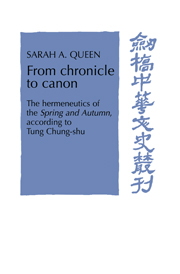Book contents
- Frontmatter
- Contents
- List of tables
- Acknowledgments
- List of abbreviations
- 1 Introduction
- PART I Three perspectives on the authenticity of the Ch'un-ch'iu fan-lu
- PART II Exegesis and canonization
- Appendix 1 The birth and death dates of Tung Chung-shu
- Appendix 2 The dates of the Han-shu 56 memorials
- Appendix 3 Han transmission of Kung-yang learning
- Appendix 4 Han dynasty disciples of Tung Chung-shu
- Appendix 5 Citations and titles attributed to Tung Chung-shu
- Appendix 6 Transmission of Ch'un-ch'iu fan-lu editions
- Selected bibliography
- Index
1 - Introduction
Published online by Cambridge University Press: 10 December 2009
- Frontmatter
- Contents
- List of tables
- Acknowledgments
- List of abbreviations
- 1 Introduction
- PART I Three perspectives on the authenticity of the Ch'un-ch'iu fan-lu
- PART II Exegesis and canonization
- Appendix 1 The birth and death dates of Tung Chung-shu
- Appendix 2 The dates of the Han-shu 56 memorials
- Appendix 3 Han transmission of Kung-yang learning
- Appendix 4 Han dynasty disciples of Tung Chung-shu
- Appendix 5 Citations and titles attributed to Tung Chung-shu
- Appendix 6 Transmission of Ch'un-ch'iu fan-lu editions
- Selected bibliography
- Index
Summary
Confucian scholars of the Han dynasty (206 b.c.e.–220 c.e.) articulated a vision of an omnipotent but disciplined sovereign who relied on their advice and counsel to align the empire with the norms of Heaven and Earth. This view of imperial government, drawn from the scriptural traditions of antiquity, defined Chinese political culture for thousands of years. Indeed, many of the institutions created during the Han persisted into the early twentieth century, when dynastic rule perished forever. The ideal of the ruler as high priest and fount of wisdom, however rarely realized, was central to what is often imprecisely called ‘the victory of Han Confucianism.’ The contrasting claims of the founding emperors just before and just after the Han period exemplify the extent to which this view of rulership supplanted the ideals of the earlier Ch'in dynasty (221–206 b.c.e.). When the first Ch'in emperor assumed the throne he did not acknowledge the role of any superhuman spirits leading him forward to success beyond paying a bare tribute to his ancestors at the ancestral shrine. Instead the emperor credited his achievements to his ability to conquer his rivals, pacify new territories, and administer them. In contrast, the founding emperor of the dynasty that succeeded the Han engaged in solemn and elaborate religious ceremonies to demonstrate that his succession to the throne followed the will of higher powers.
- Type
- Chapter
- Information
- From Chronicle to CanonThe Hermeneutics of the Spring and Autumn according to Tung Chung-shu, pp. 1 - 10Publisher: Cambridge University PressPrint publication year: 1996
- 5
- Cited by



